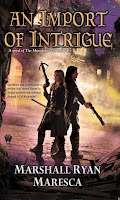First, a confession: for the past, oh who knows how long, I've been in a slump. Not just one of those cute temporary "oh golly, I don't know what scene should go here" blocks but a solid half year of writing literally nothing. Of complete writer-brain paralysis. I'm coming out of it, with the help of a therapist, because as is so often the case with these things, a bunch of root causes grew up, choked the crap out of each other, and formed this constricting tangle.
One of those pesky roots was author goals. Or rather, other people's goals for me as an author.
My own goals starting out were pretty simple:
1. Have my partner read something I wrote and say it's good.
2. Have a stranger, someone I've never met and almost definitely am not related to, read my book and like it.
3. Have enough success (that is, sales) that I don't have to assume a different pen name and start over, which I've heard authors anti-affectionately refer to as "re-branding." Note that I had no idea back then how to define "enough success."
So, my first book came out, and amazingly, #2 happened. Yay! My second book came out, and whoo-boy! #1 happened as well. (Thank you, Conejo-my-love.)
My third book... er, so here's where things get sticky. Remember how I didn't have numbers for "enough success"? Remember how it was all vague and hand-wavy and trust-everything-will-turn-outish? That was a mistake. Huge. Because instead of defining my own goals--or my own identity, as a writer--I ended up chasing someone else's goal of sufficient numbers, sufficient success. I wanted to be successful enough that my publisher wanted to keep me on, right?
But how much is that, numbers wise? How do you achieve it? What steps do you take to make that happen?
Problem was I let my success be defined by someone else's goals, without a clear understanding of what those goals were or what they entailed, and then I appropriated all of the guilt and horror when I failed to meet those goals.
My identity had become dependent upon someone else's estimation of success.
This is a shit way to live, people. It's a worse way to work. However, I had a lovely eureka moment not to long ago where I was whining to the therapist about my failures and she asked me what specific goals I'd failed to achieved, and I told her and she asked me under what circumstances I'd set those goals and I was like... hold up. I didn't make them. They aren't mine.
I never wanted to be a bestseller. I mean, it wouldn't have sucked, but I personally wasn't disappointed by a lesser splash on the scene. A writing career is a slow-burn love affair, right, not a hookup on page 1. Plus, I got goals number 1 and 2 right out of the gate, so I was good.
Then therapist -- who is exceptionally wise, which is absolutely what I pay her for -- suggested I think up new ways of defining what Success as a Writer Means for Me.
And it's this:
1. Success is that moment when I'm writing and my kid is reading over my shoulder and she laughs out loud at one of my jokes. (<--the BEST)
2. Success is writing "The End" on something, regardless of whether I have any intention of selling it ever.
3. Success is seeing hearts--or the odd "fucktacular!"--in the margins of my manuscripts after my critique partners have read a thing.
4. Success is making myself cry when I write a scene that's particularly difficult. Bonus if it ever makes someone else cry.
There will be other goals as I continue on this path through Writing Land. So far, I've gotten 1, 2, and 3 to happen and hope to replicate them. Number 4 eludes me, but it's something that is entirely within my control as a craftsperson and wordflinger.
And that's the trick, I think, to forming an identity as Yeah, I Really Am a Writer, Legit: making my own goals. Defining them clearly. Developing only goals that I have one hundred percent control over--i.e., not sales or reviews or awards.
Sticking to it, focusing...
...and letting myself, sometimes, when no one else is looking, win.












